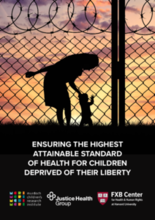Children who experience deprivation of liberty are distinguished by a high prevalence of complex, co-occurring health needs that necessitate coordinated, high-quality healthcare. Emerging evidence of very poor health outcomes after deprivation of liberty suggests that in addition to ongoing efforts to prevent detention, more should be done to improve the health of these children, both in detention and after they return to the community. Setting and implementing minimum standards for healthcare in detention can help to drive improvements in the quality of care, and thereby improve health outcomes for children who experience deprivation of liberty.
This report identifies, critiques, and synthesises current standards for healthcare for children deprived of their liberty. It considers these standards in relation to the six settings considered by the United Nations Global Study on Children Deprived of Liberty (Global Study), including
(a) detention of children in the administration of justice;
(b) children living in prisons with their primary caregiver;
(c) migration-related detention;
(d) deprivation of liberty in institutions;
(e) detention in the context of armed conflict; and
(f) detention on national security grounds.
Informed by the UN System Common Position on Incarceration, the authors conclude that there are important gaps and ambiguities in relation to the current international standards for healthcare for children across these settings.
The aim of this report is to identify these gaps and assist the United Nations Task Force (UNTF) in its efforts to support the implementation of the UN Convention on the Rights of the Child (UNCRC) and ensure that all children, including those deprived of their liberty in all settings, achieve the ‘highest attainable standard of health.

